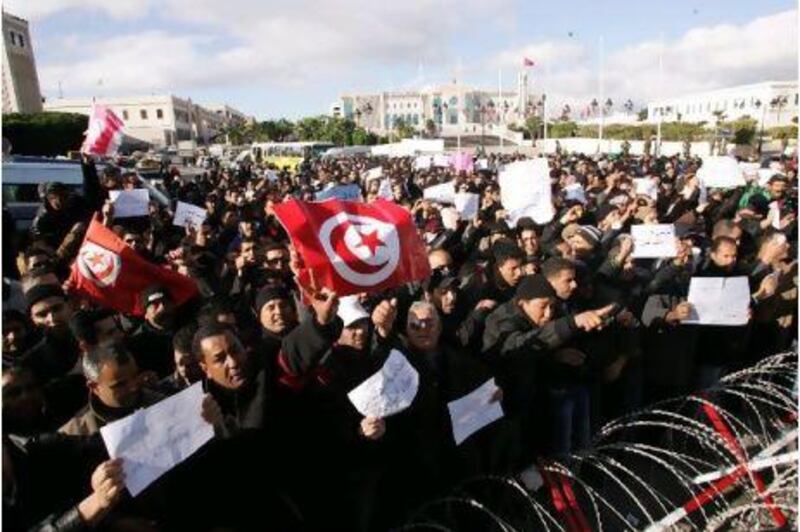TUNIS // A nerve-wracking first week for Tunisia's interim government ended yesterday.
The prime minister, Rachid Ghannouchi, announced in an emotional television appearance on Friday that he would end his political career after presidential and legislative elections expected in the next few months.
Until then Tunisia will be led by Mr Ghannouchi's interim government, a coalition hammered together last weekend when the ousted president Zine el Abidine Ben Ali fled the country after weeks of protests over unemployment and corruption.
While some Tunisians support the government, it has run into opposition from protesters who want it purged of Mr Ben Ali's political machine, the ruling Constitutional Democratic Rally party (RCD).
Mr Ghannouchi has promised free elections and a new constitution, and the government says it will look into political reform and investigate the corruption that led to Mr Ben Ali's removal.
However, anti-government protesters have turned the centre of Tunis, the capital, into a daily carnival of banners, slogans and raucous demonstrations.
Yesterday hundreds of protesters broke through a police cordon around Mr Ghannouchi's office, with one banner reading "No men of tyranny in a national unity government".
Hundreds of policemen, long viewed as the protectors of Mr Ben Ali's regime, assembled outside the interior ministry, demanding the creation of a labour union for police.
"I'm here to say 'No' to the RCD, and to gain the trust of the people," one policeman said. "Our neighbours see us as enemies, but we're victims, too."
On Friday some protests took on a religious tone as Tunisians emerged from the country's first Friday prayer since Mr Ben Ali's departure. One group of several dozen marched through central Tunis chanting, "There is no god but God, and the RCD is the enemy of God".
About 2,000 protesters mobbed the RCD's towering headquarters in central Tunis on Thursday, with several scaling a fence to break off letters from the building's sign.
The government jailed thousands of political dissidents during Mr Ben Ali's 23 years in power, and security services have often been accused of torture. Police have used batons and tear gas to quell protests, including in recent weeks.
The government says at least 78 people died in the unrest of the past month, as police opened fire on protesters. Authorities have said police used force only in self-defence, or to protect lives and public property.
Mehdi Msallma, a middle-school art teacher at the protest, said: "When police committed abuses they were often under orders; they need a union to protect themselves from such orders. We're building a new Tunisia now, and that needs good relations between the police and the people."
With street politics the order of the day, politicians have been scrambling to appease the crowds.
Mr Ghannouchi and other RCD members of the interim cabinet resigned from the party last week. Four opposition cabinet members and one minister from the RCD have backed out of their posts.
Opposition members of the government have argued that it would be unrealistic to exclude the vast RCD, which dominates both the cabinet and Tunisia's civil service.
Despite the continuing political crisis, calm is returning to Tunisia after looting and gunfights in the capital last weekend between the army and members of Mr Ben Ali's security force.
Schools and universities are expected to re-open on Tuesday, after being closed two weeks ago as protests gripped some campuses. A curfew imposed in Tunis last weekend has moved from 5pm to 8pm.
However, the country still faces serious economic problems. Economic growth in recent years has masked high unemployment among young people and in rural regions.
Protests over unemployment and corruption that began last month in the rural town of Sidi Bouzid spread across the country and spiralled into calls for Mr Ben Ali's immediate resignation.





